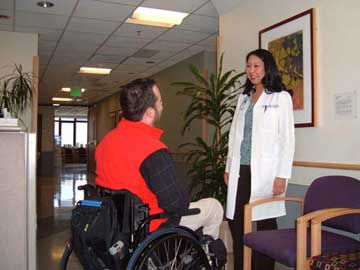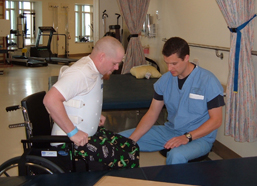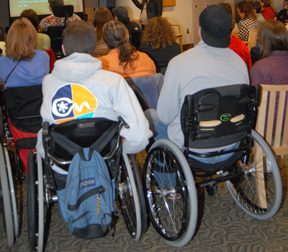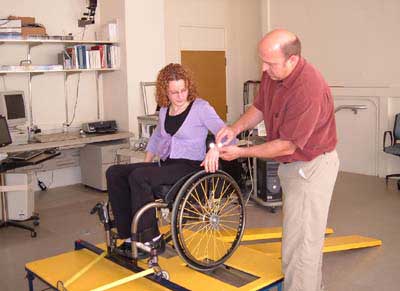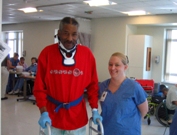SCI Forum Podcasts
Thank You to Our Supporters!
Welcome to the SCI Forum podcast series. Our podcasts bring you audio versions of our live SCI Forums, as well as interviews with a variety of people within the SCI community. Subscribe on iTunes or your favorite podcasting app.
Cannot find us on your favorite podcast app or have a question about subscribing to our podcast? Please email us at: nwrscis@uw.edu
After listening to a podcast, please give us your feedback. Click here to complete a short survey.
24. Exploring Ableism after Acquired Disability: A Panel Discussion
Presented at the SCI Forum on March 26, 2025
After a spinal cord injury, people must adapt to changes in their physical abilities while also navigating structural ableism—a system of policies, institutions, and societal norms that disadvantage disabled individuals. How does ableism shape their interactions and self-perception? And how does ableism intersect with sexism? This forum will feature a panel of women sharing their experiences with ableism after acquired disability, discussing its personal and professional effects, and exploring how it appears and is addressed in different settings. Please join us in this discussion of thoughts, perspectives, and questions on navigating ableism after spinal cord injury. The discussion will be moderated by Whitney Morean, PhD, a postdoctoral fellow in rehabilitation psychology at UW Medicine/Harborview Medical Center.
A video of this forum can be found at: Exploring Ableism after Acquired Disability: A Panel Discussion
23. Perspectives from SCI Therapists: Amy, Rehabilitation Psychology
Continuing our series on the different providers who work with spinal cord injury patients, we are joined by Amy Starosta, PhD, a rehabilitation psychologist at Harborview Medical Center. This discussion dives into what rehab psychology is, its purpose, and how a patient might utilize this type of therapy.
22. Research Spotlight: Feasibility of Sprint Interval Training During Inpatient Rehabilitation
We are joined by Deborah Crane MD, a spinal cord injury physician, to hear about her study looking at the feasibility of short, but high intensity exercise program for people with new SCI. This 2-year study will be conducted on the inpatient unit at Harborview Medical Center.
21. Research Spotlight: Hypnotic Cognitive Therapy for Pain During Inpatient Rehab
After conducting a feasibility trial, Amy Starosta PhD, a rehabilitation psychologist, discusses her new randomized control trial of hypnotic cognitive therapy for pain. This is a 3-year study taking place on the inpatient rehabilitation unit at Harborview Medical Center.
20. The ADA: What You Need To Know
In this presentation, Conrad Reynoldson, of the law firm Washington Civil & Disability Advocate (www.wacda.com), provides practical information for people with SCI who want to better understand their rights under the ADA, including what to do if you suspect a violation and how to advocate for yourself and others.
19. What do SCI Health Professionals (and Patients) Need to Know? Advice from Patients
In this forum, four individuals with different injury levels and years since injury discuss their experiences with health care providers during inpatient rehab and after discharge. Moderated by UW clinical psychologist Jeanne Hoffman, PhD.
18. Women and Spinal Cord Injury
Five women with spinal cord injuries share their experiences and offer useful information about staying healthy while living with a spinal cord injury. Originally presented on February 21, 2017 at the University of Washington.
17. The Adventures of Frank and Mustard with Simon Calcavecchia
Simon Calcavecchia is the author of the series of children's books starring the characters of Frank and Mustard. Following his spinal cord injury, Simon created the wiener dog Frank, who uses wheels instead of his hind legs, and his pal Mustard a yellow bird.
16. Finding Passion in Poetry: Lan Remme
Several years after his spinal cord injury, Lan Remme became a poet. We spoke with Lan some time ago about this journey, how he learned to write and pursue this passion, and of the valuable lessons that he learned (and that we can all learn) from finding something that brings us and others joy. In addition, writing poetry brought profound benefits for Lan.
We were deeply saddened when Lan died in June of 2021. We are grateful that we had the opportunity to speak with Lan about his poetry. This recording will be a lasting and special memento for us. There is a dedication to Lan and his family as part of this podcast. At the end, we have included a reading of one of Lan’s poems written after this interview. We hope that you will listen and find the same pleasure listening to Lan and his poetry that we did.
15. Perspectives from SCI Therapists: Celina, Speech Therapy
After spinal cord injury, individuals often work with many different rehabilitation therapists across both inpatient and outpatient rehabilitation as they recover and as function changes over time. We had the chance to talk to several different kinds of rehabilitation therapists about their work including: What is involved in becoming a therapist? What are the main things that each discipline works on with their SCI patients? Why does someone choose to be a therapist and work in rehabilitation? In the fourth podcast of this series, we talk with Celina Smith MS, CCC/SLP about her work as a speech language pathologist and learn about what speech therapists focus on when working with people who have had a spinal cord injury.
14. Discussing COVID-19 and Spinal Cord Injury
COVID-19 has changed our lives dramatically in the last seven months. From constant masking to a jump in telemedicine to quarantining, everyone has seen major disruptions to their daily routines. But what does COVID-19 mean specifically for people with a spinal cord injury? In this forum, Aaron Bunnell M.D., U.W. assistant professor of Rehabilitation Medicine and Jeanne Hoffman PhD, professor in the department of Rehabilitation Medicine and director of the Northwest Regional SCI System, discuss what we know and do not know about COVID-19 and spinal cord injury. They discussed Dr. Bunnell's work in U.W. Medicine's post COVID telehealth clinic as well as the potential issues for people with SCI and a diagnosis of COVID-19, the pros and cons of in-person routine care, and strategies for minimizing exposure from caregivers.
Video can be found at: Video: Discussing COVID-19 and Spinal Cord Injury
13. Perspectives from SCI Therapists: Kristy, Therapeutic Recreation
After spinal cord injury, individuals often work with many different rehabilitation therapists across both inpatient and outpatient rehabilitation as they recover and as function changes over time. We had the chance to talk to several different kinds of rehabilitation therapists about their work including: What is involved in becoming a therapist? What are the main things that each discipline works on with their SCI patients? Why does someone choose to be a therapist and work in rehabilitation? In the third podcast of this series, we talk with Kristy Grant, CTRS about her work as a recreation therapist and learn about what recreation (rec) therapists focus on when working with people who have had a spinal cord injury.
12. Perspectives from SCI Therapists: Leslie, Occupational Therapy
After spinal cord injury, individuals often work with many different rehabilitation therapists across both inpatient and outpatient rehabilitation as they recover and as function changes over time. We had the chance to talk to several different kinds of rehabilitation therapists about their work including: What is involved in becoming a therapist? What are the main things that each discipline works on with their SCI patients? Why does someone choose to be a therapist and work in rehabilitation? In the second podcast of this series, we talk with Leslie Fox, OTR/L about her work as an occupational therapist and learn about what occupational therapists focus on when working with people who have had a spinal cord injury.
11. Perspectives from SCI Therapists: Jordan, Physical Therapy
After spinal cord injury, individuals often work with many different rehabilitation therapists across both inpatient and outpatient rehabilitation as they recover and as function changes over time. We had the chance to talk to several different kinds of rehabilitation therapists about their work including: What is involved in becoming a therapist? What are the main things that each discipline works on with their SCI patients? Why does someone choose to be a therapist and work in rehabilitation? In the first podcast of this series, we talk with Jordan Cabrera P.T., D.P.T., N.C.S. about his work as a physical therapist and learn about what physical therapists focus on when working with people who have had a spinal cord injury.
10. Spasticity after SCI — Part 2: Real Life Stories — A Panel Discussion
Spasticity is an almost universal complication of spinal cord injury, but the way it manifests itself varies enormously from person to person. In this forum, four individuals with SCI share their unique experiences with spasticity since their injuries, what treatments they have tried over the years, and how they are managing their spasticity now. The discussion is moderated by Dr. Jeanne Hoffman, UW professor and clinical psychologist in the UW Department of Rehabilitation Medicine. Video can be found at: sci.washington.edu/spasticity-part2/
9. Spasticity after SCI — Part 1: The Good, The Bad, and The Not-So-Ugly
Spasticity in spinal cord injury is often viewed as a cause of dysfunction and pain. But there is more to it than that. This SCI Forum presentation explored the positive effects of spasticity ("the good"), the negative effects ("the bad"), the neutral effects ("the not so ugly"), and a variety of interventions for spasticity. A rehabilitation medicine physician, a physical therapist, and an occupational therapist summarized the causes of spasticity and discussed a variety of conventional and non-conventional treatment options (Rina Reyes, MD, Amy Icarangal, PT, and Geralyn Bertellotti, OT). Watch the video or read the report: sci.washington.edu/spasticity/index.asp
8. Loa: Successful Student and Vent User
Loa sustained a C2 spinal cord injury while in the 12th grade. Undaunted, she went on to finish high school with her classmates and entered college the following fall. In this podcast, Loa talks with Jeanne Hoffman, PhD, about her experience adjusting to her SCI and attending college as a ventilator user. She is now an ambassador with Ventec Life Systems and blogs at venteclife.com\blog.
7. Being a Research Subject: Follow-Up on Transcutaneous Electrical Stimulation
What was it like to be a study participant in a clinical trial at the University of Washington? Find out in this podcast, where Jeanne Hoffman, PhD, interviews Jon, a person with SCI who volunteered for the study that was highlighted in our first podcast, Transcutaneous Electrical Stimulation with Chet Moritz. This study is designed to restore hand and arm function in SCI using a non-invasive procedure. Jon shared the remarkable impact that this has made on his life.This study is currently recruiting participants. Click here to learn about the study.
6. Perspectives on Pain: An SCI Panel Discussion
A large percentage of people with SCI have frequent pain that can interfere with daily activities. Finding ways to minimize the pain and, when necessary, to move forward in spite of pain, can be essential to maintaining quality of life. This panel discussion features four individuals with SCI discussing their pain experiences, the different treatments they have tried, what has and has not worked for them, and how they stay positive and carry on with full lives. The discussion is moderated by Dr. Jeanne Hoffman, rehabilitation psychologist in the Department of Rehabilitation Medicine.
5. Managing Chronic Pain after Spinal Cord Injury
Chronic (or long-standing) pain is a common problem for people living with spinal cord injury, and it is often very difficult to treat. In this presentation, two UW Rehabilitation Medicine clinicians (Deborah Crane, MD and Dawn Ehde, PhD) discuss the different types, causes and potential treatment options for chronic pain.
4. From Engineer to Entrepreneur: BILLY Footwear's Billy Price
Billy Price became paralyzed at the C6 level at age 18, just as he was starting his freshman year of college. Lying in his hospital bed, he could not imagine what his life would look like; the challenges seemed insurmountable and the future uncertain. But he took one hurdle at a time and went on to finish college with an engineering degree and to work for the FAA for 15 years. He also married and, recently, became a father. Now 22 years after his injury, Billy has taken the leap into full-time entrepreneurship with his company, BILLY Footwear. Born out of Billy’s desire to put on his own shoes despite his limited hand function, BILLY Footwear has now rocketed into the mainstream fashion world as a universal shoe design that looks great while making putting on shoes a snap for children and anyone else who does not want to deal with laces or Velcro. How did he do it? Listen to this podcast to hear the full story of how someone with SCI and no entrepreneurial know-how created a successful company—including the ups and downs and a disaster or two along the way.
3. Transcutaneous Electrical Stimulation with Chet Moritz
Chet Moritz, PhD, is an associate professor in the University of Washington Departments of Electrical and Computer Engineering, Rehabilitation Medicine, and Physiology and Biophysics, as well as the co-director for the Center for Neurotechnology. He talks with UW rehab psychologist Jeanne Hoffman about his research to restore hand and arm function for people with spinal cord injury using transcutaneous (through the skin) electrical spinal stimulation.
2. Getting to Normal: Conversations about Adjustment after Spinal Cord Injury
Three individuals with spinal cord injuries share their personal journeys of adjusting to life with a spinal cord injury, from initial grief and dark days to finding a path to a fulfilling life and a "new normal." This panel discussion is moderated by Dr. Jeanne Hoffman, rehabilitation psychologist in the Department of Rehabilitation Medicine.
1. Resilience, Depression, and Bouncing Back After Spinal Cord Injury
Adjustment and mental health problems after spinal cord injury can be complicated and sometimes difficult to talk about. While most people with SCI do not become depressed, it is important to identify and help those who do. This SCI Forum presentation focuses on who gets depressed after SCI, when and why. Charles Bombardier, PhD, professor and psychologist in the UW Department of Rehabilitation Medicine, covers what is known about common patterns of adjustment after SCI and how emotional responses to SCI compare to other forms of loss and trauma. He discusses risk factors for depression and what can be done to manage and treat depression after SCI.
Introduction to the SCI Forum Podcast.

